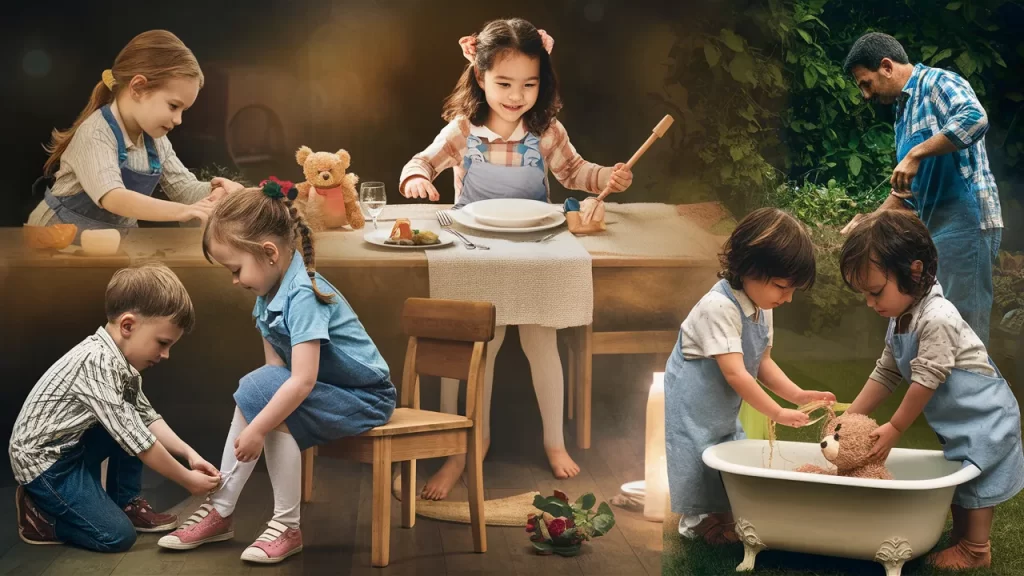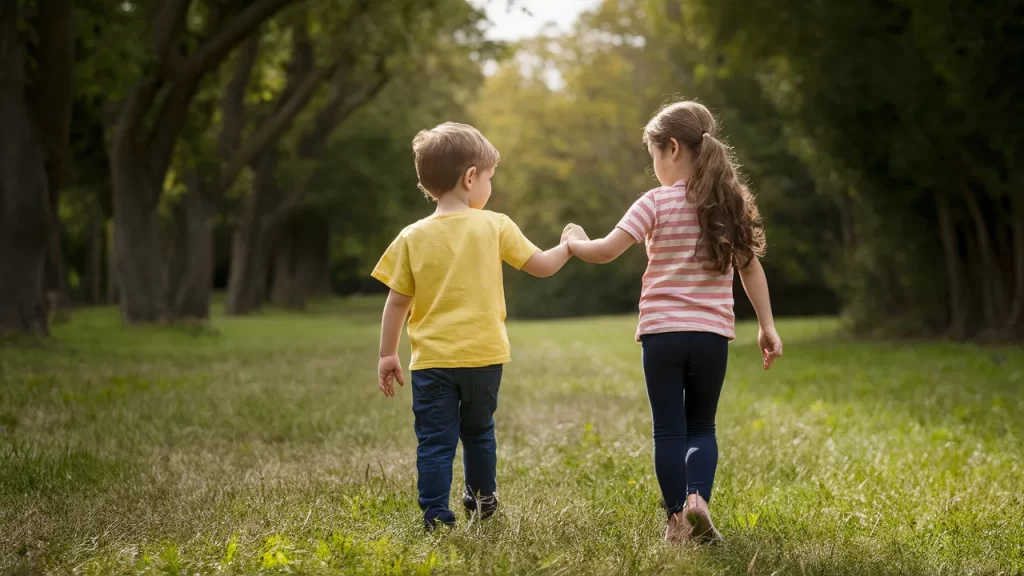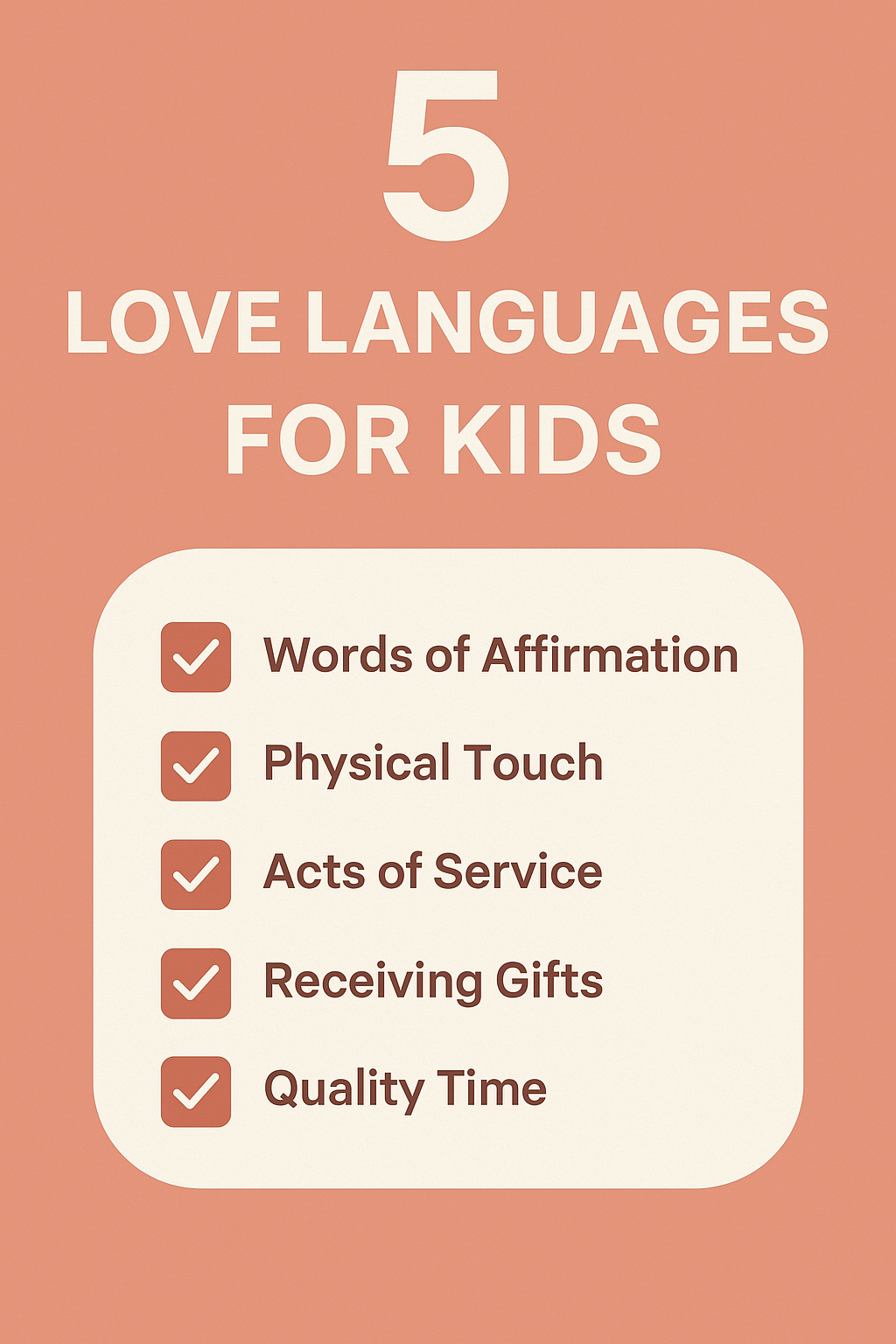5 Love Languages for Kids: Strengthen Your Parent-Child Bond
As parents, we all want to raise emotionally secure, confident children who know they’re loved. But sometimes, even when we shower our kids with affection, they might not feel as connected as we hope. That’s where understanding the 5 love languages for kids can be a game-changer.
This simple framework—originally created by Dr. Gary Chapman—helps parents speak their child’s unique emotional language. Once you discover which love language your child responds to most, you’ll notice better behavior, stronger trust, and fewer power struggles.
In this guide, we’ll break down each of the 5 love languages for kids, how to recognize them, and practical ways to use them in your parenting toolkit.
Heads up: This post may include affiliate links. As an Amazon Associate, I earn from qualifying purchases—at no extra cost to you. Full privacy policy and disclosure here.
5 Love Languages For Kids
What Are the 5 Love Languages for Kids?
The concept of love languages suggests that everyone has a preferred way of receiving love. For kids, this is even more important, because their emotional development is still in progress.
Here are the five love languages adapted for children:
- Words of Affirmation
- Physical Touch
- Acts of Service
- Receiving Gifts
- Quality Time
Understanding these languages can help you tailor your parenting so your child feels your love—not just knows it.
Words of Affirmation

This love language is all about verbal expression. Kids with this primary language light up when you compliment them, say “I’m proud of you,” or leave them sticky notes in their lunchbox.
How to Show It:
- Praise effort over results: “I saw how hard you worked on that project!”
- Whisper “I love you” in their ear during snuggles.
- Start a bedtime tradition of sharing one thing you love about them.
💡 Helpful Tool: Try a positive affirmation card deck like the Little Renegades Mindful Kids Cards for daily encouragement.
Internal Link Tip:
“Struggling with ‘I can’t do it’ meltdowns? These 8 Easy Ways to Battle the ‘I Can’t Do It’ Attitude can boost confidence fast.”
Physical Touch

How to Show It:
- Give morning and bedtime hugs.
- Create a special handshake or cuddle routine.
- Offer playful touch like piggyback rides or foot rubs.
🧸 Gift Idea: Check out the soft and calming Warmies Microwavable Plush Animals for cozy snuggles.
Acts of Service

Some kids need physical connection to feel secure. These are the children who love to cuddle, give high-fives, or curl up in your lap during storytime.
These children feel most loved when you do something kind for them—packing a favorite lunch, helping fix a broken toy, or assisting with a tough school project.
How to Show It:
- Fix their bike or toy as a surprise.
- Cook their favorite breakfast just because.
- Offer help when they don’t expect it—without them asking.
💡 Positive Parenting Tip:
“Support doesn’t mean doing everything for them. Learn how to set limits kindly with The 5 Pillars of Positive Parenting.”
📘 Book Recommendation: The 5 Love Languages of Children by Gary Chapman is a must-read for deeper insight.
Receiving Gifts

For some children, gifts are tangible reminders that they are cherished. It’s not about spoiling them—it’s about intentional, thoughtful tokens that show you were thinking of them.
How to Show It:
- Leave a note with a small surprise after school.
- Start a tradition like “Friday Finds”—one small item each week.
- Let them choose a small toy after a big accomplishment.
🎁 Fun Idea: Try the Creativity for Kids Care Package Kit to craft handmade gift items together.
Quality Time

This love language thrives on undivided attention. Eye contact, laughter, and being fully present—even for 10 minutes—can fill their cup more than any toy or treat.
How to Show It:
- Schedule 1-on-1 “dates” with each child—even just for a walk.
- Do a craft together or play their favorite board game.
- Make bedtime stories a non-negotiable routine.
🎲 Activity Boost: Bring home something interactive like the Kids Against Maturity Card Game for silly, bonding fun.
How to Discover Your Child’s Love Language
Kids don’t always say what they need directly, so look for patterns. Ask yourself:
- What makes your child light up?
- What do they request most?
- How do they show love to others?
Pro Tip: When in doubt, try all five languages consistently for a few weeks. Their favorite will often emerge naturally.
📥 Want help tracking it? Download our free printable Love Language Tracker for Kids [COMING SOON].
How the 5 Love Languages Help With Discipline
When children feel deeply loved, they’re more likely to cooperate, show empathy, and handle correction without emotional shutdown. Positive parenting isn’t about permissiveness—it’s about connection before correction.
If discipline is a daily struggle, mastering your child’s love language can help reduce outbursts and resistance.
💡 Explore more:
“These Quick Positive Parenting Tips work especially well when you tailor them to your child’s love language.”
Love Languages and Positive Parenting
Understanding the 5 love languages for kids aligns beautifully with positive parenting principles: empathy, respect, and emotional coaching. When your parenting is rooted in connection, everything else—discipline, routines, independence—flows more smoothly.
💛 Bonus Resource: I highly recommend the Positive Parenting Solutions Course, which has helped thousands of families build better relationships through communication.
Internal Link Boost:
“For a powerful combo, combine love languages with redirection strategies.”
FAQs About the 5 Love Languages for Kids
Can a child have more than one love language?
Yes, but usually one is dominant. Over time, your child might even shift based on age or life changes.
What if I don’t share my child’s love language?
You’re not alone! The key is awareness. Even if it doesn’t come naturally to you, learning your child’s love language can improve your connection immensely.
How often should I “speak” their love language?
Daily! It doesn’t always require big gestures—small, consistent moments matter most.
Are the 5 love languages backed by research?
Yes, there’s growing support for their use in parenting. Here’s a helpful article from Verywell Family explaining how love languages can improve child development.
Final Thoughts
Learning the 5 love languages for kids is one of the simplest, most powerful parenting tools out there. It helps your child feel secure, understood, and valued—laying the foundation for lifelong emotional intelligence.
Whether you’re a working parent juggling routines or a stay-at-home mom navigating toddler tantrums, this is a tool that can fit seamlessly into everyday life.
💬 Want more? Don’t miss our roundup of 7 Must-Have Positive Parenting Books to take your parenting to the next level.


I love the idea of using the five love languages to strengthen the bond with our kids. It’s such a powerful tool for building empathy and understanding between parents and children. I appreciate the practical examples provided in this post, and I’m excited to put them into practice with my own family. Thanks for sharing!
As a parent, I often struggle with how to communicate love to my kids in a way that really resonates with them. This post provided some great insights into the different ways kids experience love, and how we as parents can adapt our approach to meet their individual needs. I can’t wait to try some of these strategies with my own children!
This post is a game-changer! I had heard about the five love languages before, but I never thought about how they could apply to parenting. The practical tips and examples provided in this post have given me a new perspective on how to connect with my children on a deeper level. Thank you!